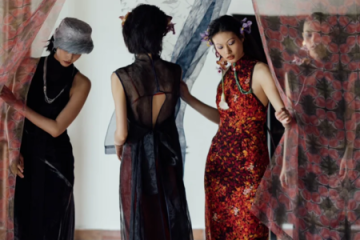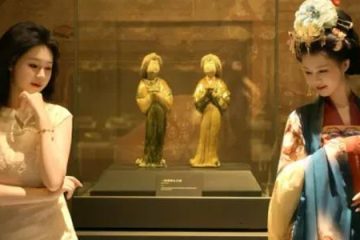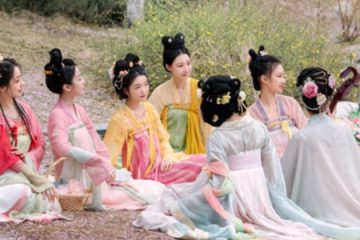Is It Disrespectful to Wear Hanfu for Cosplay?

In today’s youth culture in China, watching anime, cosplaying, posting on platforms like AcFun or Bilibili, and uploading original covers or dance videos have become everyday activities for many fans of the “ACG” (Anime, Comics, Games) world. Last year alone, China’s broader “2D subculture” community reached 219 million users, with over 95% of them born after 1990. On average, each person spent more than 1,700 yuan annually on related hobbies.
What was once a niche subculture has become mainstream. In my city of Xi’an, for example, there are now entire commercial spaces dedicated to anime and cosplay—places like Luomashi (骡马市) and Xiaozhai Yintai (小寨银泰). It’s common to see cosplayers in full costume there, and even more so at comic conventions. I’ve personally attended many of these events, and each time brings a fresh experience.
Interestingly, I’ve also noticed more and more people wearing typical Chinese outfit—traditional Han Chinese clothing—to comic conventions. Despite the summer heat and lack of air conditioning, some still show up in full makeup, hairpieces, and layered hanfu. That kind of dedication speaks volumes about how deeply people connect with the attire.
Ⅰ. Is Hanfu Cosplay?
Let’s address a question that often comes up: “Is wearing hanfu the same as cosplaying historical figures? And if so, is it disrespectful?” One of my classmates once raised this issue with me. She had a friend that admired hanfu herself but believed that if the clothing wasn’t historically accurate, wearing it disrespected the past.
While I respect her personal views, I don’t believe this kind of rigid thinking helps the community grow. If we gatekeep hanfu too much—setting high standards for historical accuracy or authenticity—it only creates stress for newcomers and fosters toxic elitism. What should be an enjoyable cultural expression risks becoming a form of social competition.
If the barrier to wearing hanfu is too high, not only will newcomers be overwhelmed by stress, but veteran enthusiasts in the hanfu community will also form cliques. This could lead to a culture of putting others down to lift oneself up, turning hanfu from a hobby into a way to show off or compete. That’s definitely not what any of us want to see. 😞

To me (it doesn’t represent everyone), wearing hanfu can be cosplay—but it doesn’t have to be.
If someone is inspired by a historical figure like Li Bai or Du Fu, wearing hanfu can be a way to feel closer to those ideals. It’s a kind of creative roleplay, yes—but it’s also a form of admiration and self-expression.
On the other hand, you might simply love the beauty of hanfu, its flowing lines, intricate embroidery, or historical elegance. That’s perfectly valid too.
Hanfu is just clothing—appreciating its beauty is fine, like admiring a German military uniform’s design without ignoring history. Wear it for its looks by all means, but stay respectful: honor China’s past, and don’t sexualize hanfu.
Ⅱ. How Should Hanfu Be Worn?

The hanfu community today has become a meaningful subculture where people connect beyond their daily lives. Whether it’s through attending hanfu festivals, joining school clubs, or participating in cultural events, wearing hanfu offers a sense of belonging and cultural pride.
In a way, putting on hanfu is a form of identity-making. It signals a personal connection to Chinese heritage and aesthetics. So yes, it’s entirely acceptable to wear hanfu as cosplay—as long as it’s done respectfully.
And don’t worry if you don’t get it perfect the first time. I still remember my first time wearing hanfu—I didn’t have makeup or a proper hairstyle and wore sneakers to a hanfu festival. It was far from flawless, but I had a great time and felt proud.

Ⅲ. Cultural Understanding
Appreciating foreign culture doesn’t mean we stop loving our own. Likewise, showing interest in foreign media shouldn’t become an excuse for others to insult Chinese traditions or identity.
If you’re someone who enjoys hanfu and have ever faced discrimination or rude remarks on the street, know that your love for this tradition is seen and valued.
Summary
If you know a young hanfu lover, see it as progress, not a unusual. What matters is whether their hobby makes them happy and fulfilled. Understanding this helps us connect with young people—and that’s how we understand the times, and the future.
At the end of the day, the real question isn’t whether this clothing is “traditional” enough—but whether it brings joy and meaning to the people who wear it. Chinese hanfu has clearly captured the hearts of many young people. Shouldn’t we, as a society, try to understand why?

After all, to understand the next generation is to understand the future.
Feel free to share your thoughts in the comments below.



0 Comments